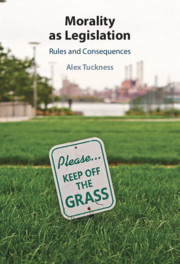Book contents
- Morality as Legislation
- Morality as Legislation
- Copyright page
- Dedication
- Contents
- Acknowledgments
- Abbreviations with Method of Citation
- Introduction
- Part I The Emergence of the Rule-Consequentialist Paradox
- Chapter 1 God and Consequences
- Chapter 2 Legislators, Architects, and Spectators
- Chapter 3 The Great Divide
- Chapter 4 Moral Expression as Legislation
- Chapter 5 Secular Heterodoxy
- Part II Contemporary Approaches to the Rule-Consequentialist Paradox
- Works Cited
- Index
Chapter 1 - God and Consequences
The Path to Locke
from Part I - The Emergence of the Rule-Consequentialist Paradox
Published online by Cambridge University Press: 29 July 2021
- Morality as Legislation
- Morality as Legislation
- Copyright page
- Dedication
- Contents
- Acknowledgments
- Abbreviations with Method of Citation
- Introduction
- Part I The Emergence of the Rule-Consequentialist Paradox
- Chapter 1 God and Consequences
- Chapter 2 Legislators, Architects, and Spectators
- Chapter 3 The Great Divide
- Chapter 4 Moral Expression as Legislation
- Chapter 5 Secular Heterodoxy
- Part II Contemporary Approaches to the Rule-Consequentialist Paradox
- Works Cited
- Index
Summary
In Grotius, Cumberland, and Locke we see the basic elements of the theological version of morality as legislation. Grotius used a framework of evaluating the consequences of different possible rules for fallible, biased people as a way of determining what ought to be done. Cumberland provided a theory of right in which all the content of all divine laws could be traced back to one divine attribute, benevolence. Locke, while less systematically consequentialist than Cumberland, had a hedonistic theory of the good, an account of God that also emphasized benevolence, and (most interestingly) a willingness to press very hard on the legislative metaphor in order to establish the correct content of natural law when it was in dispute. Locke imagines God as a legislator using precisely the structure of rationality that a human legislator would use in contemplating which law to pass, including problems of biased and fallible execution of the law. Locke’s use is clearly counterfactual. It is probably not a coincidence that both Locke and Cumberland were strong supporters of new scientific theories that sought to understand nature by means of natural laws.
Information
- Type
- Chapter
- Information
- Morality as LegislationRules and Consequences, pp. 33 - 57Publisher: Cambridge University PressPrint publication year: 2021
